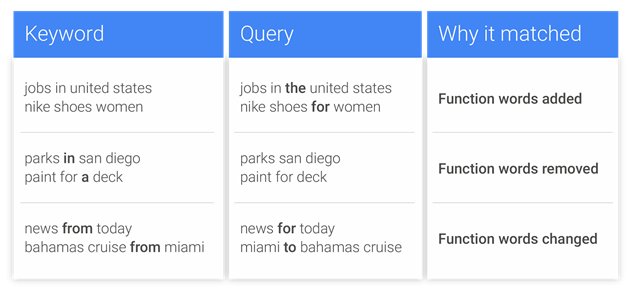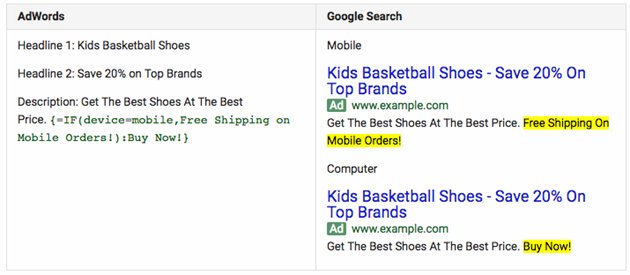In the first article of this two-part series, we covered some important recent changes to Google's search algorithms. The goal of this second article is to give digital marketers an idea of how the most significant changes in Google's paid products will affect your strategy in 2017 and beyond.
Exact Match Keyword Change for Paid Search
Heralded as the destruction of exact match keywords and everything we hold dear, the most recent exact match keyword update updates the definition of exact match close variants, potentially matching keywords to a far wider host of queries.
Essentially, Google is expanding the definition to make sure search advertisers don't have to have every variant of a keyword in their account in order to serve ads for all qualified searches.
For example, to serve for the query [nike shoes for women], we'd need to have the word "for" included in our exact match keyword. Since the search intent behind both [nike shoes for women] and [nike shoes women] is the same, Google wants to make sure you're serving for both of the searches.

Google does clarify: It'll still be attempting to match for the most accurate keyword. So, if you do have both terms in your account, everything is business as usual: Your longer-tail variant will still have a higher AdRank, and that will be the keyword matched to. For anyone relying on broader keywords, however, or if the adding of function words (like "for") would change the intent of searches for your product, be sure to add these function words (for, the, from, to, etc.) as negatives to the applicable ad groups/campaigns.
Exact match keywords will also start matching to queries in which the search terms have been reordered. Consider, for instance, this example from Google:

Phone Number Changes for Ads
The next biggest change this year was the decision to start automatically adding call extensions to AdWords ads—a move by Google to continue to build value in its AdWords product by giving customers insight into phone calls.
The call tracking/analytics space has undergone so much growth precisely because consumers and Google are realizing there's an incredible amount of value to be had from calls.
Gone are the days in which pay-per-click (PPC) advertising is viable only for e-commerce or SaaS businesses. Home services and retail receive lots of phone calls, and for PPC agencies and in-house managers to prove value (especially to those clients with smaller budgets), calls are quickly becoming a primary key performance indicator (KPI).
The new call extensions will automatically be added to ads that don't have call extensions. Where will they get the phone numbers, you ask? Google stated that it'll be pulling phone numbers "prominently" featured on landing pages. How "prominent" does a phone number have to be? Well, we're still not sure, but per that announcement, and the one about Google's pulling in GMB numbers to ads to replace call extensions, it's likely most ads will end up having a phone number if there is one featured on the page at all.
The important point to note here, however, is that regardless of the number pulled in you can still override the automated call extension with extensions you set up yourself.
Clearly, then, the update is a big push for Google to have everyone running numbers on all their ads. It makes AdWords that much more valuable, and it provides more value to searchers looking for businesses, products, and more on Google.
For any advertiser running DNI (dynamic number insertion) on its site, Google has stated it won't automatically pull numbers from that site.
In contrast to advertisers' ability to override these automated extensions with their own manually added extensions, Google's announcement to possibly pull numbers from multi-location Google My Business (GMB) listings and add those, instead of call extensions, doesn't give us much faith in having full control over what extensions run. What this would mean is that multi-location businesses will start to see fewer calls coming in through their call extensions, and more coming in through the GMB numbers. The biggest issue here is the mixing of paid and organic results. When previously you knew that a call to the GMB number was due to organic, now a call to that number could be from paid.
Because we can't imagine Google wants us to live in this world of ambiguity, we'll likely see another announcement this year clearing up this issue.
IF Functions in AdWords Ads
Announced in January of this year, IF functions provide the same amount of functionality advertisers previously had with ad customizers, but without the feed via spreadsheet.
These functions allow you to customize your ads based on specific dates, placement in certain audience segments, device type, and more. These functions can add a lot of value to your current ads, depending on your target market, product, and current account segmentation. See the example:

Your ad copy can vary based on the device the user is on or the user's presence on a certain audience list. This function is particularly helpful for e-commerce businesses, especially those that don't have the account expertise or time to segment these categories into their own campaigns.
That said, for a smaller account there may not be a significant enough search volume to warrant segmenting all your mobile traffic into another campaign, or for targeting different audience segments in separate campaigns. In that case, using an IF Function could provide tremendous value:

So: What Should PPC Marketers Expect?
With the exact match keyword change, a lot of advertisers without a robust keyword list will see an increase in search volume. That said, anyone who's already running a large variety of long-tail exact match keywords, alongside phrase and broad variants with robust negative lists, will likely see little to no change at all.
The important thing here is to continue to be vigilant with your negative work, and the change shouldn't affect your account much one way or another. If your keyword list could have done with being built out further by additional exact match variants, it could even help your account (which is Google's intention).
With Google's change to call extensions, we should continue to remember that phone calls are a valuable KPI for most businesses. Even e-commerce and SaaS companies get phone calls, so it's important to gain insight into calls. Even more valuable are the calls that come into businesses as a primary KPI: Home services, doctors, etc. all rely on phone calls to keep the doors open, so it's that much more important to track them properly. That's why it becomes even more important to choose the right call tracking/analytics vendor to get you and your clients the insight they need.
With IF functions in ads, we should expect increased competition as ads become even more targeted toward specific audience segments. Remarketing lists for search (RLSA) has been out for a long time, but not all advertisers are taking advantage of audience segmentation to change both their bids and their ad copy. Google's move to add IF functions is a move to bring this kind of ad customization to more advertisers, add more value to AdWords as a platform, and provide a better ad experience for searchers.
* * *
It's still a very exciting time for advertisers in PPC. As search volume increases, our toolset continues to grow; and as our tool set continues to grow, so does our value as marketers. With all the changes listed in this article, we should see increased activity in our accounts, more phone calls, and better CTRs.
So long as we continue to monitor these changes and implement them advantageously in our accounts, we should stay ahead of the curve and we and our clients should continue to be happy.




